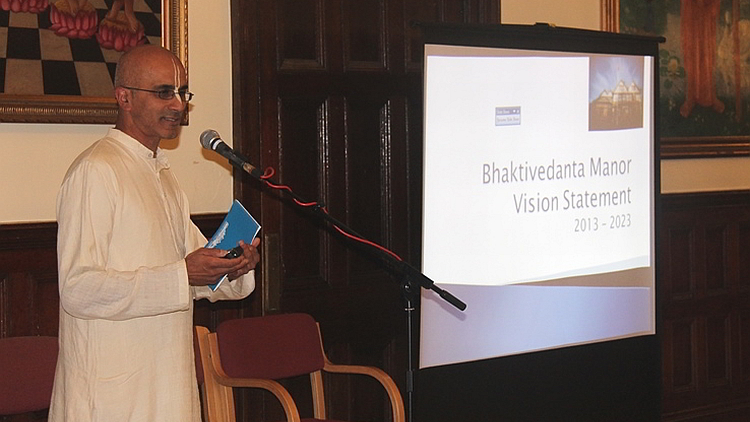Bhaktivedanta Manor Unveils New Vision Statement
By Madhava Smullen | Сен 26, 2013

On the 11th of September, the brand new Bhaktivedanta Manor Vision Statement for the next ten years was unveiled at a gathering in the community’s temple near London.
The specific date was chosen because it was the day when, 44 years ago, ISKCON Founder Srila Prabhupada first set foot in the UK.
One hundred key persons involved in the development of the Vision Statement attended. Temple President Sruti Dharma Das, as well as Gauri Das and Akhandadhi Das, spoke at the event, while Vision Facilitator Sitarama Das along with Krish Raval explained how the project was born.
Bhaktivedanta Manor, of course, is the UK’s flagship temple and is internationally renowned as a very successful center with financial stability and plentiful growth.
However back in January 2010, the Manor was facing an array of internal challenges, as many temples do at one point or another.
This led the Temple Council to ask some fundamental questions about how it was functioning, such as How do we deal with tensions and challenges? What is the basis of our decision making; what rationale is being applied? Why have we chosen a particular path? Who decides? Is the Manor effective in what actions it undertakes? And what is the best way to move forward?
To analyze whether or not it was functioning effectively, the Temple Council decided to conduct a formal organizational review.
“We decided to conduct two consultations,” says Sitarama Das, who has been part of the Bhaktivedanta Manor community since 1985, and was involved in senior management for over fifteen years. “The first was in February 2010 with the internal management of the temple. And then in November 2010, there was a broader consultation with all the different groups connected with the Manor.”
Next, in April 2011, a ten person vision team was established, consisting of Prabhupada disciples, previous managers of the Manor, elder devotees in the community, preachers and sanga group leaders, stakeholders and council members, brahmacharis and brahmacharinis, and Kuli and Pandava Sena youth.
They were assisted by a wider consulting group of twenty-six people.
All these devotees spent the next two years discussing and debating, defining and articulating the mission and purpose of Bhaktivedanta Manor.
The result is a fifty-four page document, based on Srila Prabhupada’s vision and teachings, particularly his seven purposes for ISKCON.
There are no specific goals or action items in the Vision Statement, but rather the document acts as a sort of constitution for Bhaktivedanta Manor.
Its purpose is to encapsulate the essential, so that whatever happens in the future, the ship of the Manor will be kept aligned to the direction that Srila Prabhupada wanted of it.

Devotees gather at the launch of Bhaktivedanta Manor’s Vision Statement
The Vision Statement consists of eight key areas: Following Srila Prabhupada, The Role of Bhaktivedanta Manor, Management and Leadership, Unity in Diversity, Education, Care, Varnashrama and Sustainability, and Outreach.
“Each of these sections contains guiding principles to keep Krishna consciousness at the forefront of all areas of temple activity, so it doesn’t veer off to something else,” Sitarama says.
For example, in the “Following Srila Prabhupada” section, Prabhupada is established as the primary authority, the process by which to consult guru, sadhu and sastra is explained, and the Manor pledges to provide “spiritual health checks” for devotees.
In “The Role of Bhaktivedanta Manor,” the Manor’s responsibility as a spiritual embassy of iconic and historic status is discussed, as well as keeping the sanctity of its core aspects and avoiding over-commercialization.
In “Management and Leadership,” Prabhupada’s principles of management, leadership in Krishna consciousness, support for managers, and devotee maintenance is brought up amongst other points.
Principles are also given in the document for developing an inclusive and appealing culture; working in such a way as to deepen devotees’ spiritual experiences, and not just their cultural experiences; developing a culture of care and Vaishnava relationships; ensuring that there are suitable role models in education; nurturing talent and potential; pastoral care and critical life junctures; spiritual, social and economic sustainability; and different aspects of outreach.
Now that the Vision Statement has been completed, the next step for the Vision Team will be setting goals related to each section of the Statement. The aim is to complete this step by mid 2014.
“Then we’ve got another eight or nine years for implementation of those goals, up until the 50th anniversary of Bhaktivedanta Manor in 2023,” says Sitarama.
And what about after that?
“The whole idea is that this will be an ongoing process, not one that’s just done and forgotten,” Sitarama explains. “Every ten years we’ll review the process and have a team asking, ‘Are we doing what we promised to do?’ It’s a cycle, basically.”
Of course, the challenge now is for the Manor’s management to effectively implement the whole process.
If they do, Sitarama feels that this vision process will help turn Bhaktivedanta Manor into a proactive rather than a reactive temple. He also believes it might be a good template for other ISKCON temples around the world to follow.
“It’s a very thought-provoking process,” he says. “When others see the document and the process used, they may be inspired to try and do something similar, with Prabhupada’s seven purposes at heart.”
Until then, this is an important time in history for Bhaktivedanta Manor.
“The document is a very important one,” Sitarama says, “Because it really helps to guide, to redress imbalances and sharpen the Manor’s alignment to Srila Prabhupada’s directions. It’s a road map for the coming years.”
Нажмите здесь and scroll down to the bottom of the page to read Bhaktivedanta Manor’s Vision Statement.















